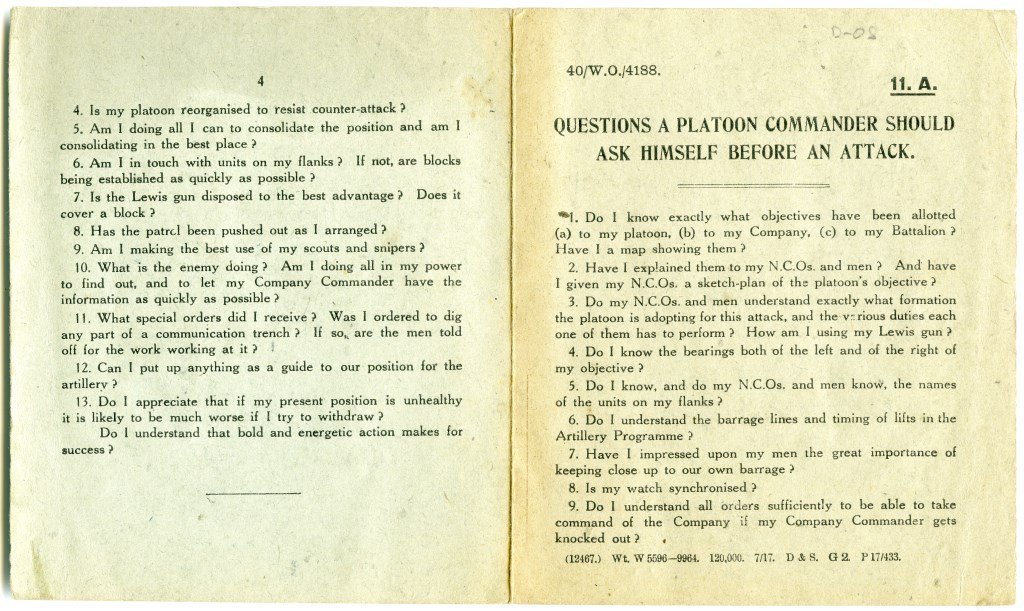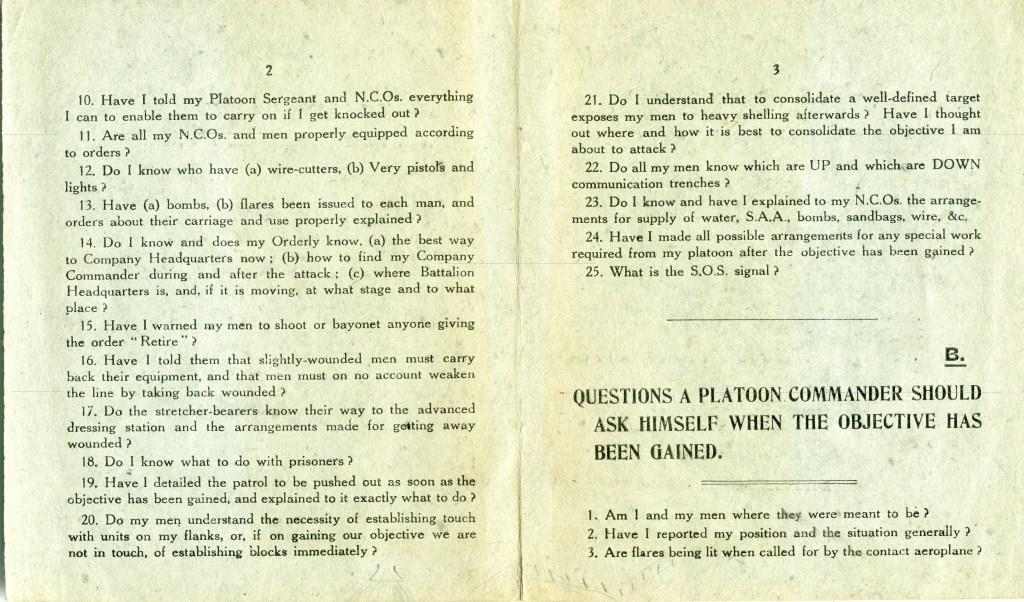Dublin Core
Title
Questions A Platoon Commander Should Ask Himself Before An Attack
Subject
British Tactical Notes
Description
This pamphlet serves to illustrate the way trench warfare was conducted by the British in 1918. By this point in the war, armies were as adapted as they would ever be to the conditions and problems that the trenches presented. Infantry units adjusted through increased autonomy, new tactics and ways of waging war, and the introduction of new technology. The points presented in this document reflect these changes-- in the electric lights used in nighttime attacks, the communication trenches, and the Lewis gun, a uniquely British weapon during this period.
The brutality that the First World War came to be associated with is also evident. The ways in which the soldiers were expected to treat their own comrades, the expectation of complete ruthlessness with no empathy allowed, and the relative worthlessness of individual soldiers' lives are all included examples.
The brutality that the First World War came to be associated with is also evident. The ways in which the soldiers were expected to treat their own comrades, the expectation of complete ruthlessness with no empathy allowed, and the relative worthlessness of individual soldiers' lives are all included examples.
Source
McFarlin Library, Department of Special Collections and University Archives, University of Tulsa. 2933 E. 6th St. Tulsa, Oklahoma 74104-3123
Publisher
War Department
Date
1917-1918
Language
English
Identifier
1992.004.1
Coverage
<kml xmlns="http://earth.google.com/kml/2.0"><Folder><name>OpenLayers export</name><description>Exported on Mon Apr 01 2013 18:48:37 GMT-0500 (Central Daylight Time)</description></Folder></kml>||||osm
Great Britain
Great Britain
Document Item Type Metadata
Text
Questions A Platoon Commander Should Ask Himself Before An Attack.
1. Do I know exactly what objectives have been allotted (a) to my platoon, (b) to my Company, (c) to my Battalion? Have I a map showing them?
2. Have I explained them to my N.C.Os and men? And have I given my N.C.Os a sketch-plan of the platoon’s objective?
3. Do my N.C.Os and men understand exactly what formation the platoon is adopting for this attack, and the various duties each one of them has to perform? How am I using my Lewis gun?
4. Do I know the bearings both of the left and of the right of my objective?
5. Do I know, and do my N.C.Os and men know the names of the units on my flanks?
6. Do I understand the barrage lines and timing of lifts in the Artillery Programme?
7. Have I impressed upon my men the great importance of keeping close up to our own barrage?
8. Is my watch synchronized?
9. Do I understand all orders sufficiently to be able to take command of the Company if my Company Commander gets knocked out?
10. Have I told my Platoon Sergeant and N.C.Os everything I can to enable them to carry on if I get knocked out?
11. Are all my N.C.Os and men properly equipped according to orders?
12. Do I know who have (a) wire-cutters, (b) Very pistols and lights?
13. Have (a) bombs, (b) flares been issued to each man, and orders about their carriage and use properly explained?
14. Do I know and does my Orderly know. (a) the best way to Company Headquarters now: (b) how to find my Company Commander during and after the attack: (c) where Battalion Headquarters is, and if it is moving, at what stage and to what place?
15. Have I warned my men to shoot or bayonet anyone giving the order “Retire”?
16. Have I told them that slightly-wounded men must carry back their equipment, and that men must on no account weaken the line by taking back wounded?
17. Do the stretcher-bearers know their way to the advanced dressing station and the arrangements made for getting away wounded?
18. Do I know what to do with prisoners?
19. Have I detailed the patrol to be pushed out as soon as the objective has been gained, and explained to it exactly what to do?
20. Do my men understand the necessity of establishing tough with units on my flanks, or, if on gaining our objective we are not in touch, of establishing blocks immediately?
21. So I understand that to consolidate a well-defined target exposes my men to heavy shelling afterwards? Have I thought out where and how it is best to consolidate the objective I am about to attack?
22. Do all my men know which are UP and which are DOWN communication trenches?
23. Do I know and have I explained to my N.C.Os the arrangement for supply of water, S.A.A, bombs, sandbags, wire, &c,
24. Have I made all possible arrangements for any special work required from my platoon after the objective has been gained?
25. What is the S.O.S. signal?
1. Do I know exactly what objectives have been allotted (a) to my platoon, (b) to my Company, (c) to my Battalion? Have I a map showing them?
2. Have I explained them to my N.C.Os and men? And have I given my N.C.Os a sketch-plan of the platoon’s objective?
3. Do my N.C.Os and men understand exactly what formation the platoon is adopting for this attack, and the various duties each one of them has to perform? How am I using my Lewis gun?
4. Do I know the bearings both of the left and of the right of my objective?
5. Do I know, and do my N.C.Os and men know the names of the units on my flanks?
6. Do I understand the barrage lines and timing of lifts in the Artillery Programme?
7. Have I impressed upon my men the great importance of keeping close up to our own barrage?
8. Is my watch synchronized?
9. Do I understand all orders sufficiently to be able to take command of the Company if my Company Commander gets knocked out?
10. Have I told my Platoon Sergeant and N.C.Os everything I can to enable them to carry on if I get knocked out?
11. Are all my N.C.Os and men properly equipped according to orders?
12. Do I know who have (a) wire-cutters, (b) Very pistols and lights?
13. Have (a) bombs, (b) flares been issued to each man, and orders about their carriage and use properly explained?
14. Do I know and does my Orderly know. (a) the best way to Company Headquarters now: (b) how to find my Company Commander during and after the attack: (c) where Battalion Headquarters is, and if it is moving, at what stage and to what place?
15. Have I warned my men to shoot or bayonet anyone giving the order “Retire”?
16. Have I told them that slightly-wounded men must carry back their equipment, and that men must on no account weaken the line by taking back wounded?
17. Do the stretcher-bearers know their way to the advanced dressing station and the arrangements made for getting away wounded?
18. Do I know what to do with prisoners?
19. Have I detailed the patrol to be pushed out as soon as the objective has been gained, and explained to it exactly what to do?
20. Do my men understand the necessity of establishing tough with units on my flanks, or, if on gaining our objective we are not in touch, of establishing blocks immediately?
21. So I understand that to consolidate a well-defined target exposes my men to heavy shelling afterwards? Have I thought out where and how it is best to consolidate the objective I am about to attack?
22. Do all my men know which are UP and which are DOWN communication trenches?
23. Do I know and have I explained to my N.C.Os the arrangement for supply of water, S.A.A, bombs, sandbags, wire, &c,
24. Have I made all possible arrangements for any special work required from my platoon after the objective has been gained?
25. What is the S.O.S. signal?
Original Format
Pamphlet

